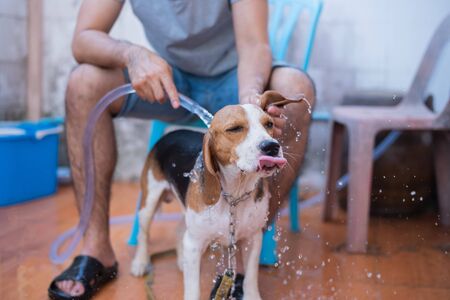Introduction to Natural Pet Grooming
In recent years, a noticeable shift has occurred among British pet lovers, with many choosing natural and DIY grooming solutions for their beloved companions. This movement is fuelled by a growing awareness of sustainability, environmental impact, and animal welfare. Pet owners across the UK are increasingly seeking alternatives to commercial grooming products that may contain harsh chemicals or unnecessary additives. Instead, they are turning to homemade remedies and eco-friendly practices that not only care for their pets’ skin and coats but also align with their values of protecting the planet and ensuring animal wellbeing. This trend highlights a broader cultural embrace of natural living and mindful consumer choices within the UK’s vibrant pet community.
2. Common Ingredients Found in British Homes
British pet lovers are increasingly turning to natural, do-it-yourself grooming solutions, often using ingredients already found in the kitchen cupboard or garden shed. The appeal lies not only in cost-effectiveness but also in the reassurance that these products are gentle and safe for beloved pets. Many everyday items in British homes double as effective components in pet grooming routines. Here’s a closer look at some of the most popular and accessible choices:
| Ingredient | Benefits | Typical Uses |
|---|---|---|
| Oats | Soothes itchy skin, reduces inflammation, gentle exfoliant | Oatmeal baths for dogs with sensitive skin; homemade dry shampoos |
| Chamomile | Calms irritated skin, mild antiseptic properties, relaxing scent | Infused rinses for coats; cooling sprays for anxious pets |
| Bicarbonate of Soda (Baking Soda) | Deodorises fur, neutralises odours, mild cleanser | Paw soaks; dry shampoo blends; cleaning brushes and combs |
| Coconut Oil | Moisurises coat and skin, helps with shedding, antifungal properties | Coat conditioner; paw balm; detangling agent for long-haired breeds |
These ingredients are favoured not just for their effectiveness but also because they are free from harsh chemicals commonly found in commercial pet products. Oats can be ground into a fine powder and added to warm bathwater for a soothing soak, especially useful during pollen season when pets are more prone to allergies. Chamomile tea bags can be brewed and cooled to create a gentle rinse, particularly helpful after muddy countryside walks. Bicarbonate of soda is an old-fashioned staple in many British households, and its use extends to absorbing odours from dog beds or freshening up pet collars. Meanwhile, coconut oil—now widely available on supermarket shelves—serves as both a topical treatment and supplement for skin health.
When preparing DIY grooming blends at home, it’s crucial to ensure all ingredients are unflavoured, unsweetened, and free from additives that could harm your pet. By choosing these common British household staples, pet owners can offer safe and effective care while enjoying peace of mind about what goes onto their furry companions’ skin and coat.

3. Popular Natural Grooming Solutions
Step-by-Step DIY Pet Bathing with Oatmeal
What Youll Need:
– 1 cup of plain porridge oats
– A blender or food processor
– Warm water
– A jug or small bucket
How to Prepare:
Blend the oats into a fine powder and dissolve them in warm water. Pour the mixture into your pet’s bath, ensuring it is well mixed. Allow your pet to soak for 5–10 minutes, gently massaging their coat. Rinse thoroughly with clean, lukewarm water. This natural remedy is popular among British pet owners for its soothing effect on sensitive or itchy skin.
Homemade Coat Conditioner with Coconut Oil
What Youll Need:
– 1 tablespoon of coconut oil (melted)
– 2 cups of lukewarm water
– A spray bottle
How to Prepare:
Mix the melted coconut oil with the warm water and pour into a spray bottle. Lightly mist your pet’s coat after bathing, then brush through to distribute evenly. This helps restore shine and softness while protecting against dryness—an ideal solution for pets prone to dull fur during the UK’s colder months.
Paw Care Using Olive Oil Balm
What Youll Need:
– 2 tablespoons of olive oil
– 1 tablespoon of shea butter (optional)
– A small container
How to Prepare:
Melt the olive oil and shea butter together, allow it to cool slightly, then store in a clean container. Apply a thin layer to your pet’s paws after walks—especially useful during winter when pavements are salted or dry. This balm helps soothe cracked pads and protects against environmental irritants found on British streets and countryside trails.
Ear Cleaning Solution with Apple Cider Vinegar
What Youll Need:
– 1 part apple cider vinegar
– 1 part cooled boiled water
– Cotton wool balls or pads
How to Prepare:
Mix equal parts apple cider vinegar and cooled boiled water. Moisten a cotton wool ball with the solution and gently wipe your pet’s outer ear area—never insert anything deep into the ear canal. This method is favoured by many UK pet lovers as a gentle way to help prevent wax build-up and maintain healthy ears.
Note:
Always patch-test any homemade treatment first, and consult your local vet if your pet has allergies or sensitive skin conditions. These DIY solutions are designed for general maintenance, not as substitutes for professional care when needed.
Benefits and Precautions
Natural DIY grooming solutions have become increasingly popular among British pet lovers, not only for their eco-friendly appeal but also for the perceived health benefits they offer to pets. However, as with any homemade product, it is important to weigh both the advantages and potential risks before incorporating them into your pet’s routine.
Health Benefits of Natural DIY Grooming Solutions
Many British pet owners choose natural ingredients such as oatmeal, coconut oil, apple cider vinegar, and herbal infusions to care for their animals. These ingredients are praised for their ability to soothe sensitive skin, reduce irritation, and maintain a shiny coat without exposing pets to harsh chemicals. Some commonly reported benefits include:
| Natural Ingredient | Potential Health Benefit |
|---|---|
| Oatmeal | Soothes itchy or inflamed skin |
| Coconut Oil | Moisturises dry fur and skin |
| Apple Cider Vinegar | Acts as a natural deodoriser and may help with flea prevention |
| Aloe Vera Gel (pet-safe) | Cools hot spots and minor abrasions |
| Chamomile Tea Rinse | Calms irritated skin and promotes relaxation during grooming |
Precautions: Risks and Allergies
Despite their natural origins, some DIY grooming products can still pose risks to pets. Allergic reactions, skin sensitivities, and even toxicity can occur if inappropriate ingredients or incorrect concentrations are used. Essential oils, for instance, are particularly risky for cats due to their unique metabolism.
Common Risks Associated with Homemade Pet Products:
- Allergic Reactions: Redness, itching, swelling, or excessive licking may indicate an allergy.
- Toxicity: Certain plants and oils (like tea tree or citrus) can be toxic if ingested or absorbed through the skin.
- Ineffective Formulation: Incorrect dilution or preparation might render the product useless or harmful.
- Bacterial Contamination: Homemade products without preservatives can spoil quickly.
When Should You Consult a Vet?
If your pet has pre-existing skin conditions, shows any adverse reaction after using a homemade solution, or you are uncertain about the safety of specific ingredients, it is always wise to consult your local vet. British veterinary professionals can provide advice tailored to your animal’s needs and ensure that your commitment to natural care enhances—rather than compromises—your pet’s wellbeing.
5. British Community Perspectives
Across the UK, pet owners and grooming professionals alike are embracing natural DIY solutions, sharing their experiences and trusted remedies within their local communities. Many British pet lovers value both sustainability and animal welfare, making plant-based, chemical-free grooming options especially appealing. According to Sarah from Manchester, “I’ve been using an oatmeal rinse for my cocker spaniel’s sensitive skin—its gentle, effective, and I know exactly what goes on her coat.” Professional groomers in London also report a rise in requests for herbal infusions and home-blended oils. James, a certified groomer in Bristol, shares, “Clients increasingly ask for lavender or chamomile rinses to calm anxious pets during their sessions. These natural alternatives have become quite mainstream in our salon.” Online forums and local pet groups echo this trend, with many members swapping recipes for homemade paw balms and discussing the benefits of using products like apple cider vinegar for coat shine. Emma, a cat owner from Leeds, testifies: “A simple coconut oil rub keeps my British Shorthair’s fur soft without the worry of harsh chemicals.” These collective insights highlight how British pet communities are not only prioritising their animals’ health but also fostering a culture of knowledge-sharing around accessible, natural grooming practices.
6. Environmental and Ethical Considerations
One of the key reasons natural DIY grooming solutions have become so popular among British pet lovers is their strong alignment with the UK’s deeply rooted values of sustainability, eco-friendliness, and animal welfare. In a society where environmental consciousness is becoming increasingly mainstream, many pet owners are keen to minimise their ecological footprint even when it comes to caring for their furry companions.
Sustainable Choices in Everyday Care
Traditional pet grooming products often contain harsh chemicals and come in single-use plastic packaging, which can contribute to pollution and landfill waste. By opting for homemade grooming treatments using simple kitchen ingredients—such as oatmeal, coconut oil, or apple cider vinegar—pet owners can drastically reduce their reliance on synthetic products and unnecessary packaging. This approach supports a more circular economy and reflects the British commitment to reducing waste and promoting sustainable living.
Eco-Friendly Practices at Home
DIY grooming also encourages the use of reusable tools, such as washable cloths or natural fibre brushes, further cutting down on disposable items. Many British households already prioritise recycling and composting; extending these habits to pet care is a natural progression that resonates with eco-minded individuals across the UK.
Supporting Animal Rights Ethically
In addition to environmental benefits, natural DIY grooming aligns closely with the UK’s strong stance on animal rights. Making your own grooming products ensures complete transparency over every ingredient used, eliminating exposure to potentially harmful substances. Many commercial shampoos and sprays may be tested on animals or contain animal-derived ingredients; by creating gentle, plant-based alternatives at home, British pet lovers can guarantee cruelty-free care for their pets.
Ultimately, embracing DIY natural grooming solutions allows Britons to care for their animals in a way that is kind not only to their pets but also to the planet. It represents a holistic approach that respects both nature and animal wellbeing—an ethos at the heart of modern British culture.


